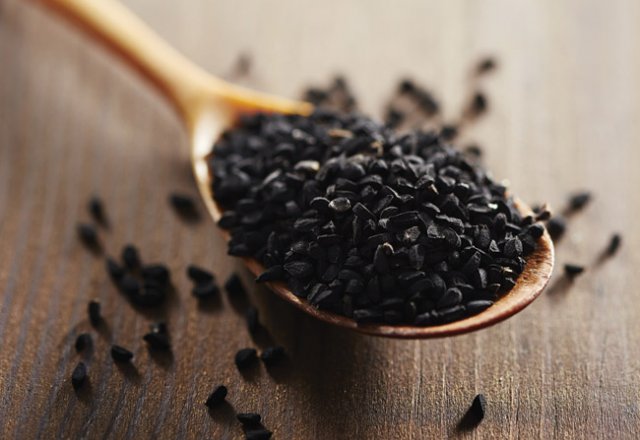
Black seed oil

An antioxidant powerhouse!
Move over chia and sesame, there’s a new super seed set to steal the spotlight: black seeds.
Sally O'Neil explores the benefits of this ancient liquid remedy.
What is black seed oil?
Black seed oil is made from nigella sativa, a plant native to Asia. Used for thousands of years in herbal medicine, black seed oil is said to offer a wide range of health benefits to those with ailments and diseases, as well as improving general health.
The plant is grown from the Near East to India, with the rectangular seeds used in the production of the oil. One of the key components of black seed oil is thymoquinone, a powerful antioxidant compound found only in nigella sativa. Aside from its active ingredient, black seed oil also contains eight of the nine essential amino acids, carbohydrates, fatty acids, and dietary fibre, as well as minerals such as calcium, iron, sodium and potassium.
Background
Black seed oil has been used Used by ancient Greeks, Egyptians and Romans, medicinally for centuries. As we look for more and more natural remedies to everyday illness, this oil has been once again propelled into the spotlight. So what are the benefits?
Health benefits of black seed oil
Black seed oil is touted as a natural remedy for the following health conditions:
- Colds and flu
- Headaches
- Diabetes
- High blood pressure
- Inflammation
- Allergies
- Low immunity
- Bronchitis
- Arthritis
Although research on the health benefits of black seed oil is limited to date, a number of university studies and journal articles have shown remarkable results, supporting its traditional uses.
Diabetes
A study published in Planta Medica in 2002 showed diabetic rats supplemented with black seed oil benefitted from lower blood sugar levels.
Arthritis
According to a study published in Phytotherapy Research in 2012, black seed oil may be effective in the treatment of rheumatoid arthritis. The study followed 40 women with rheumatoid arthritis who took a placebo every day for one month. The same women then took black seed oil capsules each day for the following month. Results showed that the black seed oil led to a significant improvement in joint swelling and stiffness.
Allergies
A 2009 study published in Pulmonary Pharmacology & Therapeutics, reported that tests on rats determined that black seed oil helped control allergic responses by reducing inflammation in the airways.
Sources and dosage
To maintain good health, take a teaspoon of black seed oil mixed with one teaspoon of pure honey, twice daily. Black seed oil is widely available for purchase online, in health food stores and stores specialising in dietary supplements.
Top Tips
For restful sleep, mix a teaspoon each of black seed oil and honey into your herbal tea before bed.
For relief from minor muscular aches and pains, utilise as a massage oil at the site of discomfort.
For a nourishing face mask, mix one tablespoon of black seed oil with one tablespoon of olive oil. Apply to clean skin and cleanse after one hour.
Disclaimer:
It’s important to note that self-treating a chronic condition with black seed oil may have serious consequences. If you’re considering the use of black seed oil in treatment of a chronic condition, consult your primary care provider.
For more information on Sally O'Neil visit her website.


